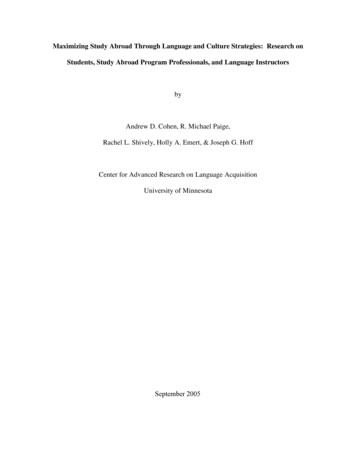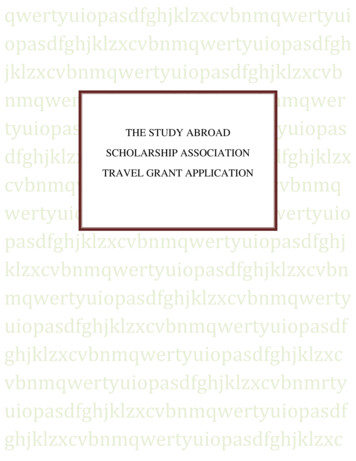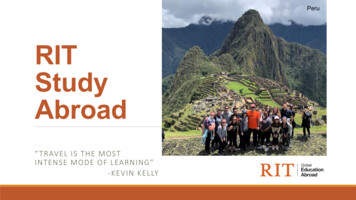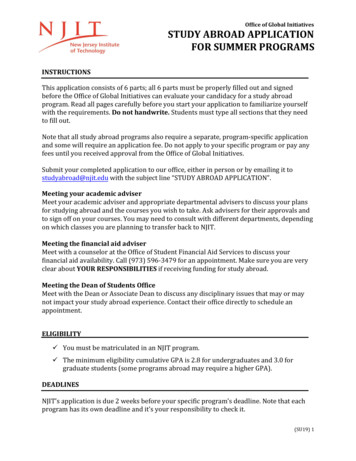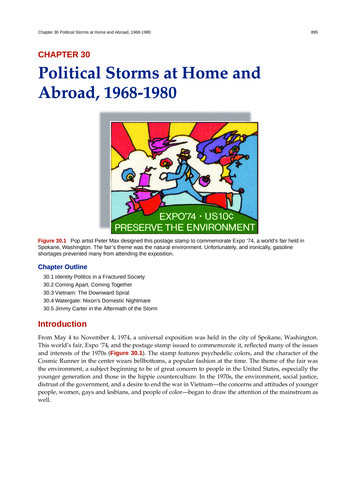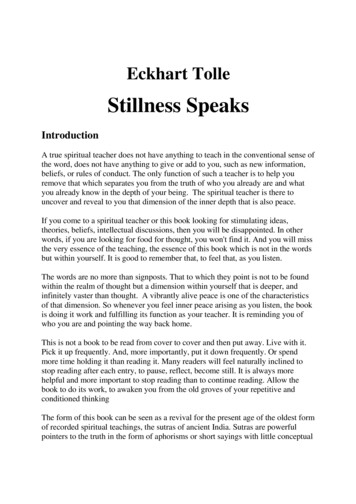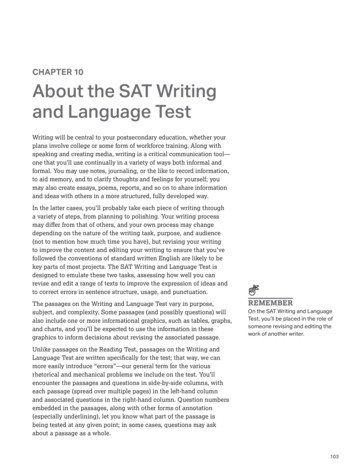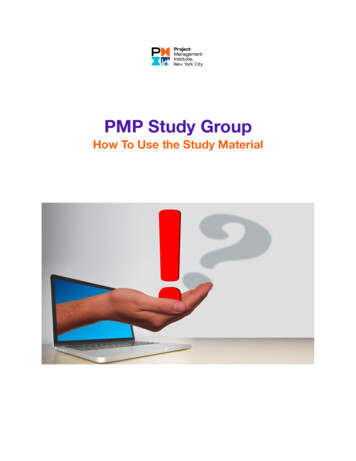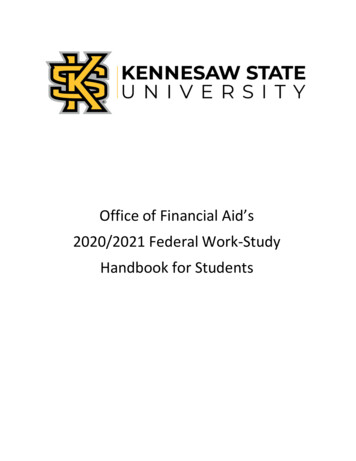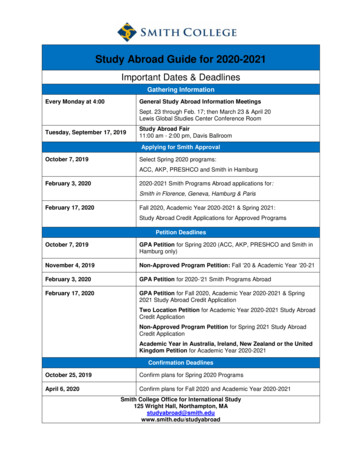
Transcription
Study Abroad Guide for 2020-2021Important Dates & DeadlinesGathering InformationEvery Monday at 4:00General Study Abroad Information MeetingsSept. 23 through Feb. 17; then March 23 & April 20Lewis Global Studies Center Conference RoomTuesday, September 17, 2019Study Abroad Fair11:00 am - 2:00 pm, Davis BallroomApplying for Smith ApprovalOctober 7, 2019Select Spring 2020 programs:ACC, AKP, PRESHCO and Smith in HamburgFebruary 3, 20202020-2021 Smith Programs Abroad applications for:Smith in Florence, Geneva, Hamburg & ParisFebruary 17, 2020Fall 2020, Academic Year 2020-2021 & Spring 2021:Study Abroad Credit Applications for Approved ProgramsPetition DeadlinesOctober 7, 2019GPA Petition for Spring 2020 (ACC, AKP, PRESHCO and Smith inHamburg only)November 4, 2019Non-Approved Program Petition: Fall ‘20 & Academic Year ‘20-21February 3, 2020GPA Petition for 2020-‘21 Smith Programs AbroadFebruary 17, 2020GPA Petition for Fall 2020, Academic Year 2020-2021 & Spring2021 Study Abroad Credit ApplicationTwo Location Petition for Academic Year 2020-2021 Study AbroadCredit ApplicationNon-Approved Program Petition for Spring 2021 Study AbroadCredit ApplicationAcademic Year in Australia, Ireland, New Zealand or the UnitedKingdom Petition for Academic Year 2020-2021Confirmation DeadlinesOctober 25, 2019Confirm plans for Spring 2020 ProgramsApril 6, 2020Confirm plans for Fall 2020 and Academic Year 2020-2021Smith College Office for International Study125 Wright Hall, Northampton, MAstudyabroad@smith.eduwww.smith.edu/studyabroad
Study Abroad Checklist1. Are you eligible? See page 2 for eligibility requirements: a 3.0 GPA, declared your major, no morethan 48 transfer credits for a semester program or 32 for a year-long program,and are studying abroad for the 1st time as a Smith student See pages 3 & 4 for language proficiency and study abroad in Africarequirements.2. Assess your own goals and needs What do you want to learn? What kind of classroom and teaching environment are you looking for? What kind of living situation best suits you? How long can you be away from Smith? Use the Study Abroad Worksheet to help you with these questions (Appendix A)3. Learn about Smith study abroad policy Attend a Study Abroad General Information Session (Mondays Sept. 23through Feb. 17; as well as March 23 and April 20) Read this Study Abroad Guide4. Explore program options Attend the Study Abroad Fair on Tuesday, Sep 17, 11:00-2:00, Davis Ballroom Review the list of Study Abroad Programs Approved for Smith Credit Visit the Resource Room & Library, read student evaluations, browse programmaterials, talk with peer advisors Talk to faculty, returned students and program representatives5. Select a program (or two) Determine program or university application deadlines, and obtain applicationmaterials Submit applications to study abroad programs (two maximum) in advance ofprogram application deadlines6. Seek Smith approval for your study abroad plans Submit the Smith College online Study Abroad Credit Application or SmithProgram Abroad Application (one for each program, two programs maximum),by the deadlines listed on the cover of this Study Abroad Guide7. Apply for a passport; check expiration date if you already have a passport. Allow at least4-6 weeks for processing if you must apply or renew your passport8. Confirm your study abroad plans Accept offer of admission from a study abroad program Submit confirmation paperwork9. Attend required Pre-Departure Orientation session10. Go abroad!
Table of ContentsStudy Abroad Checklist .Inside front coverIntroduction. 2Study Abroad Eligibility Requirements and Pre-requisites . 2Study Abroad Language Proficiency Policy . 3Choosing the Right Program . 5Study Abroad Exceptions and Petitions . 7Applying for Smith Study Abroad Approval. 9Application to a Program or University . 10Earning Academic Credit . 12Money Matters: Who Pays What? . 15Financial Aid . 19Preparing To Leave Smith . 20Preparing To Go Abroad . 21Arriving Abroad and Finalizing Registration. 23Appendix A: Study Abroad Worksheet . 24Appendix B: Study Abroad Approved Program List . 26Appendix C: Plan of Study Form . 28Appendix D: Major Adviser and Departmental Approval Form . 31Appendix E: Study Abroad for Ada Comstock Scholars & Transfer Students Guidelines . 32About the Office for International Study Inside back cover1
IntroductionSmith College has been a pioneer in the field of study abroad since it sent students to Paris on oneof the first “Junior Year Abroad” programs in 1925. We continue to be a leading liberal arts collegein the support of study abroad. Study Abroad programming is overseen by faculty on the Committeeon Study Abroad, which is a sub-committee of the Committee on Academic Priorities as part of facultygovernance for the Smith curriculum. The Committee on Study Abroad is responsible for theselection, review and approval of programs on the Study Abroad Approved Program List (seeAppendix B.) The Office for International Study is charged with the support and oversight of studentparticipation on these programs.Our goals for the study abroad experience are: To promote study abroad opportunities that are in keeping with the educational aims of thecollege. To provide program options that offer outstanding academic content, instruction, languagelearning and cultural immersion opportunities in the host countries. To ensure other first-rate study abroad opportunities that accommodate a range of disciplinesand include diverse regions of the world. To integrate study abroad into the student's four-year plan of study to the fullest extentpossible.Students are expected to select a study abroad program from the Approved Program List. In thisGuide you will learn more about how to select a program appropriate for your academic and personalinterests.Nearly 40 percent of Smith students study abroad for a semester or a year, in a variety of programsin Africa, Asia, Europe, Latin America, and English-speaking countries around the world. Studyabroad provides a new perspective on your own country; it also provides you with a new view ofyourself – of your capacity to adapt, to grow, to be open to new experiences – and perhaps also ofyour own limitations, which you may want to learn to transcend. Inevitably, it changes your life.Study Abroad Eligibility Requirements and Pre-requisitesThe first step in applying for study abroad approval is to make sure that your meet the eligibilityrequirements set for Smith College study abroad and that you receive advance approval from theOffice for International Study. In addition, you will need to meet the admission eligibility requirementsfor your chosen study abroad program or host university.For Smith study abroad approval, you are expected to meet these eligibility requirements: Demonstrate evidence of maturity, responsibility and preparation for study abroad; Have a 3.0 overall grade point average and be in good academic standing at the time ofapplication: students placed on probation after receiving approval to study abroad will havetheir approval rescinded; Be in good standing in student conduct matters at the time of application and up until departurefor the approved program; You must declare a major by the end of the registration period for the second semester ofyour sophomore year; however, you may declare earlier. If you plan to study abroad, you mustdeclare a major before you submit your study abroad application in early February of yoursophomore year. You must apply and be accepted into a concentration before you can declareit. If you are declaring a Five College Certificate, there are additional steps with the FiveCollege Consortium, and more information can be found on the Five College website. (Note:if you are planning on a self-designed major, you must meet first with Dean Danielle Ramdathin the Class Deans Office.) Demonstrate language proficiency for languages taught at Smith and/or adequate preparationfor study in Africa (see Language Proficiency Requirements and Study in Africa, next page);2
Have no credit shortage when the program starts;Not exceed transfer credit limit requirements: no more than 38 transfer credits when startinga year-long program, or 54 transfer credits when starting a semester-long program. Academicresidency requirements may apply, see Appendix E for details; Not have previously studied abroad as a Smith student; students are eligible to study abroadonce, for a maximum of two semesters.Approval for study abroad is also dependent on the following Smith rules: “Candidates for a degree must complete at least 4 semesters of academic work, a minimumof 64 credits, in academic residence in Northampton; two of these must be completed duringthe junior or senior year.” (Smith College Bulletin) Students may not be away from the college on leave for more than one year. “A student whowishes to be away from the college for more than one year must withdraw.” (Smith CollegeBulletin) Students on medical leave are not eligible to study abroad the following semester. Student accounts must be in good standing at the time of application and prior to the start ofthe term abroad.In all instances, Smith College reserves the right to approve, retract or deny a student's participationin study abroad.Study Abroad Language Proficiency PolicyStudents must demonstrate proficiency in host country languages when that language is taught atSmith.French, German, Italian, Spanish, and Russian:For programs where courses are taught in the host country language: Two or more years ofcollege study or equivalent proficiency demonstrated by two semester courses at the 200level, or one semester course at an advanced 200 level or 300 level.For study on the Smith Program Abroad in Paris: Students normally take 4 four credit courses,including FRN250 (or higher) in the spring prior to study in Paris. Those who enter Smith atthe FRN 230 level or above are required to take three semesters of French prior to study inParis, including FRN250 (or higher) in the semester prior to study in Paris. Students beginningwith FRN 101 and 103 (Accelerated Beginning French I and II) must take three 4-credit Frenchcourses in their sophomore year, including the 250 level course (or higher). Applicants to theLes Sciences à Paris track may apply with only one year of college-level French or equivalent.Exceptions for the Smith Program Abroad in Hamburg: for the spring semester, students musthave at least three semesters of college-level German or the equivalent prior to the start ofthe program.Exceptions for the Smith Program Abroad in Geneva: For admission to Track A and/or TrackC, at least one semester of college-level French or equivalent is required prior to the start ofthe program; ability to communicate in elementary French is expected. Students with one yearor the equivalent of college-level French are eligible to Track B (spring). Students applying forthe full year in Track B are required to have two years of college-level French or the equivalent.For programs with English-language curriculum: One year of college study of the host countrylanguage (or equivalent proficiency demonstrated by one semester course at an advanced100 (intermediate) level or higher). Exception: 1 year or intensive summer equivalent of Italianis strongly recommended, but not required, for ICCS in Rome.Arabic, Chinese, Hebrew, Japanese, Korean, and Portuguese:One year of college study or equivalent proficiency demonstrated by one semester course atan advanced 100 (intermediate) level or higher.3
Exceptions to the Language Requirements for Selected Science Programs: Exceptions to theSmith Study Abroad Language Proficiency Policy are made for the following programs: Arava Institute for Environmental Studies. While a full year of either Hebrew or Arabic isrecommended, students may attend without language prerequisites. Hong Kong University of Science and Technology (HKUST). Students may attend withoutlanguage prerequisites but must study Chinese during the entire time at HKUST. SIT Madagascar: Biodiversity and Natural Resource Management. Students may attend withthree semesters of French; students study French for Natural Sciences and ElementaryMalagasy.These exceptions are allowed with the goal of encouraging increased access to non-English speakingdestinations for the study of STEM-related fields.Language Preparation in Other World LanguagesStudents are encouraged, but not required, to learn host country languages available at other collegesprior to studying abroad. Languages taught through Five College Center for Study of WorldLanguages (https://www.fivecolleges.edu/fclang) include Czech, Danish, Hindi, Hungarian, ModernGreek, Mongolian, Nepali, Swahili, Thai, Tibetan, Twi, Vietnamese, and Wolof. Swahili and Hindi havementored programs.Studying in AfricaStudents planning to study in Africa must take one course related to Africa or themes of racial identityprior to their term abroad.Study in Australia, Ireland, New Zealand and the United Kingdom is limited to one semester, witha few exceptions. Check the Approved Programs List to see the approved terms for each program.Ada Comstock Scholars & Transfer StudentsAda Comstock Scholars and transfer students interested in study abroad should meet with the Deanof Ada Comstock Scholars or their Class Dean and review Study Abroad for Ada Comstock Scholarsand Transfer Students (Appendix E).International StudentsNon-U.S. citizens must keep in mind several important visa considerations when planning to studyabroad, including U.S. visa renewal requirements, applying for a 3rd country visa for study abroad,and visa requirements for each country travelled through, before, during, and after their study abroadprogram, including transit visas.Most consulates and embassies will require a non-U.S. citizen applicant to have a valid U.S. entryvisa in order to apply for a travel or international study visa. If you have a current U.S. visa, it is highlyrecommended to apply for the 3rd country study abroad visa from the United States. However, if youneed to renew your U.S. visa, you may only do so outside the U.S. and will need to plan accordingly.Applying for a 3rd country study abroad visa from outside the U.S. may take longer, with a higher riskof your study abroad visa application being delayed or denied.As you look at possible study abroad destinations, please note that in most cases, internationalstudents are not eligible for study abroad in their own country of origin as student visas andinternational student enrollment are aimed for those who are not currently citizens of the country.An additional important consideration is eligibility for Optional Practical Training (OPT) on your returnfrom study abroad. An OPT application must be sent from within the U.S. and can take several monthsfor approval. Please consult with the International Students & Scholars Office if you are planning toutilize OPT after your return from study abroad.4
Choosing the Right ProgramThe key to a successful study abroad experience is to plan ahead! Most students start planning earlyin the fall of the academic year prior to the year in which they will study abroad. Attend one or moreof the Information Sessions held at the Lewis Global Studies Center, visit the Study Abroad Fair inSeptember, and carefully review the programs on the Study Abroad Approved Programs List to makesure that you have not overlooked options you might not have initially considered.You will want to consider local cultural, political or infrastructural factors which may influence yourexperience abroad (i.e., nationality, religion, racial or ethnic heritage, gender, sexual orientation,accessibility, or any special medical needs). For example, if you are concerned about expressions ofidentity, you will want to investigate local cultural norms and laws regarding gender identity: somecultural environments can be hostile and/or discriminatory toward expressions of identity that areconsidered comfortable in Northampton. If you have mobility or health-related limitations, you willwant to make sure that adequate access and support facilities are available.We encourage you to discuss any concerns with the program/host university and/or staff at the LewisGlobal Studies Center.Adapting to a Foreign CultureThe mental, physical and emotional energy of adapting to an unfamiliar environment or culture canbe challenging. Anyone studying abroad should anticipate some form of “culture shock,” a loss ofemotional equilibrium when confronted with a set of unspoken rules for social interaction differentfrom those of your home country. Food and housing arrangements may be very different, and you’llfind that comforts and choices you took for granted at home won’t be found where you expect them.The duration and intensity of study abroad may make a loss of emotional equilibrium more commonin study abroad than in ordinary travel. This loss of equilibrium is likely to exacerbate existingproblems such as anxiety, depression, or eating disorders. Although your local programadministrators have experience in helping students through difficult patches, the local health servicesfor supporting complex problems may be limited in many countries. Furthermore, problems thatbecome exacerbated by the challenges of your new location can distract from your academic successand cultural integration abroad.Talk about your study abroad plans with your parents, counselors, and therapists, especially if youthink that you may be susceptible to such stress. As you make plans to manage your health whileabroad, we encourage you to set up a “continuity of care” plan if you have any chronic healthconditions. Our office can assist you in communicating your health needs with your chosen program.If you will need any special accommodations, we recommend you let us know at least three monthsprior to your departure. It is also important to keep our office or the local program staff updated onany changes to your medical status or condition.Consider Your Academic NeedsIt is important to honestly examine your personal and academic motives for pursuing study abroad.Consult with your mentors, including your academic advisers, before you expend a lot of energy onan idea that may not be suited to your academic goals. While living in a foreign culture will havelifelong benefits, they are not the same as those of studying in that same culture, especially if you areenrolled at local host universities. At the same time, although you are away from Smit
Smith in Florence, Geneva, Hamburg & Paris February 17, 2020 Fall 2020, . 2021 Study Abroad Credit Application Two Location Petition for Academic Year 2020-2021 Study Abroad . College Consortium, and more information can be f

